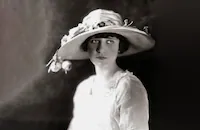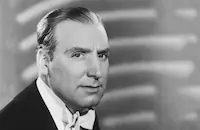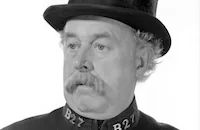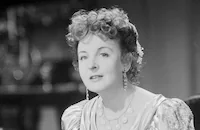Voltaire

Brief Synopsis
Cast & Crew
John G. Adolfi
George Arliss
Doris Kenyon
Margaret Lindsay
Alan Mowbray
Reginald Owen
Film Details
Technical Specs

Synopsis
Author Voltaire has been banished from the French court because he holds King Louis XV responsible for abuses of power. Voltaire still exercises some influence through his friendship with Mme. de Pompadour, the king's mistress, but he fails to prevent the execution of Calas when Count de Sarnac convinces the king that he is guilty of treason in order to gain his estate. Voltaire has Nanette Calas, the dead man's daughter, brought to his house to protect her from de Sarnac, who has put a price on her head. With the help of Mme. de Pompadour, Votaire is allowed to present a play to the king which tells Nanette's story allegorically. Masked behind the play's historical setting, the events portrayed outrage the king, but when Voltaire starts to demonstrate the parallels to present day events, de Sarnac points out that the play is really about King Louis. Voltaire is arrested and accused of treason, but before he is sent to the Bastille, he reveals that de Sarnac has been passing state secrets to Frederick the Great of Prussia. His enemy undone, Voltaire presents Nanette to the king, who restores her estates and her father's good name.

Director

John G. Adolfi
Cast

George Arliss

Doris Kenyon

Margaret Lindsay

Alan Mowbray

Reginald Owen
Theodore Newton
Gordon Westcott
David Torrence
Murray Kinnell

Doris Lloyd

Ivan Simpson

Douglas Dumbrille
Helena Phillips

Leonard Mudie
Crew
Charles Alexander
George Baxter
Leo F. Forbstein
David Forrest
Tony Gaudio
Paul Green
Al Greene
Ray Griffith
Anton Grot
Carl Guthrie
Glen Harris
Martin Hershey
Maude T. Howell
Owen Marks
Orry-kelly

Film Details
Technical Specs

Articles
Voltaire
Although the titles credit the screenplay's source material as a "novel" authored by novelist George Gibbs and lawyer E. Lawrence Dudley, the two amateur dramatists, aware of Arliss' intrigue with Voltaire, actually crafted a stage play for the actor's approval in the '20s. The suitably impressed Arliss tried in vain to get the project produced for Broadway, and the actor proffered it to then-WB production chief Darryl Zanuck. The scenario for Voltaire (1933) drew its inspiration from a genuine cause celebre of 1764 France, even if it played fairly fast and loose with the facts. The thrust comes from the author's ultimately unsuccessful bid to intercede on behalf of the condemned political prisoner Jean Calas. This failure only stokes the defiant wordsmith into shielding Calas' disgraced daughter Nanette (Margaret Lindsay), and engaging in anonymous pamphleteering protesting the policies of Louis XV (Reginald Owen).
While Voltaire's foremost ally at court, Madame Pompadour (Doris Kenyon), tries to keep her liege and lover off of the author's trail, the devious minister Count De Sarnac (Alan Mowbray) has put two and two together. De Sarnac determines to identify the author not just as the notorious seditionist, but as the leak responsible for transmission of France's military secrets to Voltaire's known correspondent, Frederick the Great of Prussia. It will take all of the author's wit and guile to uncover the true betrayer and restore Nanette's good name.
The real Jean Calas was a prosperous Protestant merchant with an emotionally fragile son who had openly spoken of converting to Catholicism. The elder Calas returned home one day to find the boy a suicide, and made the fatal mistake of trying to cover up the circumstances. The authorities presupposed that Calas killed his son to prevent his conversion, and he received a rapid conviction and execution. It was Voltaire's interest, analysis and public comment on this rush to judgment that ultimately embarrassed the authorities into posthumously rehabilitating Calas' name and compensating his family.
Voltaire was flavorfully directed by John G. Adolfi, a journeyman since the silent era who had finally gained repute through his seven collaborations with Arliss at Warner. When he wasn't assaying great men of history, Arliss paid the bills via audience pleasing comedies and farces, and Adolfi was behind the camera for several of his best, including The Millionaire (1931), A Successful Calamity (1932), The King's Vacation (1933) and The Working Man (1933). Sadly, not long after Voltaire wrapped, Adolfi died of a cerebral hemorrhage at age forty-five.
For his part, Arliss subsequently followed Zanuck to Fox, bringing his bravura skills to The House of Rothschild (1934), and several others. He took on a handful of screen assignments in his native Britain before retiring in 1937 to care for his ailing spouse and frequent leading lady Florence Montgomery. Arliss, who filmgoers also owe for his promotion of a young Bette Davis as a talent to watch, passed away at age 77 in 1946.
Producer: Raymond Griffith
Director: John G. Adolfi
Screenplay: George Gibbs (novel), E. Lawrence Dudley (novel), Paul Green, Maude T. Howell
Cinematography: Tony Gaudio
Film Editing: Owen Marks
Art Direction: Anton Grot
Music: Bernhard Kaun, Milan Roder
Cast: George Arliss (Voltaire), Doris Kenyon (Madame Pompadour), Margaret Lindsay (Nanette Calas), Alan Mowbray (Count De Sarnac), Reginald Owen (King Louis XV), Theodore Newton (Francois).
BW-72m.
by Jay S. Steinberg

Voltaire
Quotes
Trivia
Notes
Although the work by George Gibbs and E. Lawrence Dudley is called a novel on screen, no evidence has been found of its publication in that form. Modern sources note that Gibbs and Dudley wrote a play specifically for George Arliss who had a longtime ambition to play Voltaire. It was never performed but was the basis for Maude Howell and Paul Green's adaptation.














